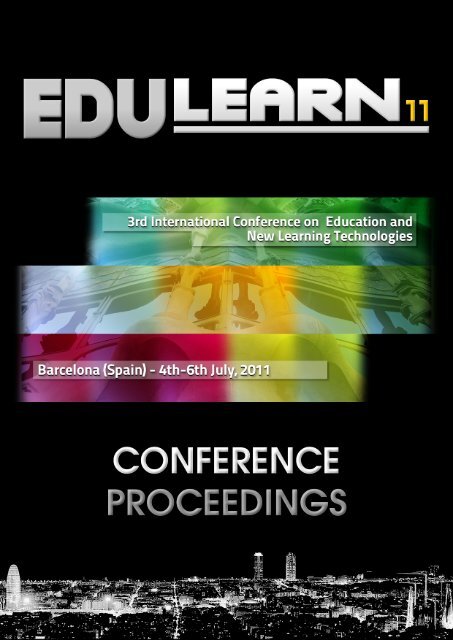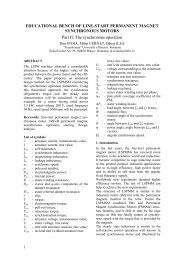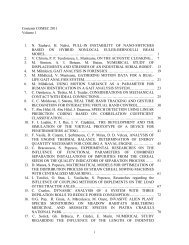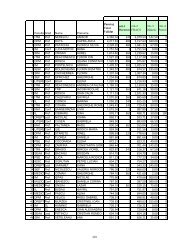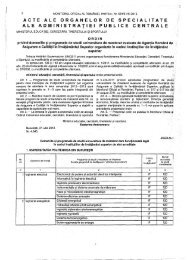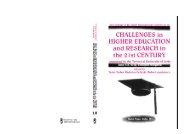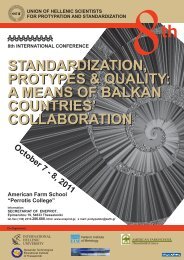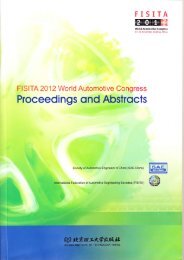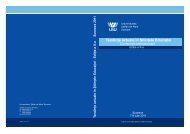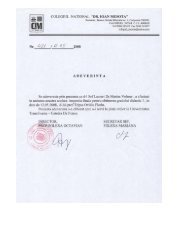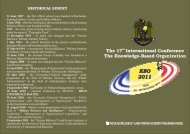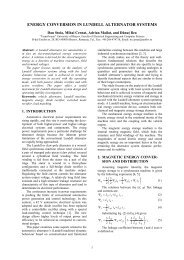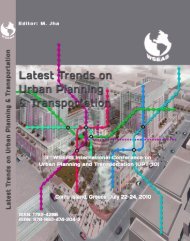EDULEARN11 Proceedings CD (ISBN: 978-84-615-0441-1) - Portal
EDULEARN11 Proceedings CD (ISBN: 978-84-615-0441-1) - Portal
EDULEARN11 Proceedings CD (ISBN: 978-84-615-0441-1) - Portal
Create successful ePaper yourself
Turn your PDF publications into a flip-book with our unique Google optimized e-Paper software.
Published by<br />
International Association of Technology, Education and Development (IATED)<br />
www.iated.org<br />
<strong>EDULEARN11</strong> <strong>Proceedings</strong> <strong>CD</strong><br />
Edited by<br />
L. Gómez Chova, D. Martí Belenguer, A. López Martínez<br />
International Association of Technology, Education and Development<br />
IATED, Valencia, Spain<br />
<strong>ISBN</strong>: <strong>978</strong>-<strong>84</strong>-<strong>615</strong>-<strong>0441</strong>-1<br />
Depósito Legal: V-2332-2011<br />
Book cover designed by<br />
J.L. Bernat<br />
All rights reserved.
<strong>EDULEARN11</strong><br />
International Conference on Education and New Learning Technologies.<br />
WELCOME INTRODUCTION<br />
Dear <strong>EDULEARN11</strong> participants,<br />
In this third edition of <strong>EDULEARN11</strong>, we are delighted to welcome you all to this<br />
international conference that brings together experts from every corner of the world.<br />
<strong>EDULEARN11</strong> is a key annual networking event for the sector of new learning<br />
technology and education experiences. Academics and researchers presenting at this<br />
conference will share with you their most up-to-date information on education and<br />
pedagogical innovations. This is an excellent opportunity to acquire skills and get<br />
inspired by listening to innovative approaches in education. It’s the ideal place for<br />
those who wish to know more about educational experiences and who wish to discuss<br />
the latest innovations with other educational experts.<br />
We hope you get the best of <strong>EDULEARN11</strong> presentations and parallel sessions,<br />
discussions and debates, as well as the posters exhibition. This event also aims to be a<br />
social platform and a great opportunity for networking in a varied atmosphere.<br />
<strong>EDULEARN11</strong> makes every effort to bring together delegates from all disciplines and<br />
cultures. This year we welcome 650 professionals and experts representing more than<br />
65 countries. This makes this conference a multicultural meeting point for lecturers,<br />
researchers, educational scientists, and technologists.<br />
We hope you take <strong>EDULEARN11</strong> as an opportunity to exchange ideas and results, to<br />
discover different ways of applying new educational technologies and broaden your<br />
vision about new ways of teaching and learning. In addition to your professional<br />
experience, Barcelona will offer you a large offer of cultural and leisure activities to<br />
enjoy during your stay here. We really wish you an unforgettable stay in this<br />
cosmopolitan and interesting city.<br />
Thank you very much for coming to <strong>EDULEARN11</strong> and for contributing to the<br />
improvement of Education with your experiences and projects. We wish you a fruitful<br />
conference!<br />
<strong>EDULEARN11</strong> Organising Committee
<strong>EDULEARN11</strong><br />
International Conference on Education and New Learning Technologies.<br />
SCIENTIFIC COMMITTEE AND ADVISORY BOARD<br />
Agustín López SPAIN Kamarulzaman Ab. Aziz MALAYSIA<br />
Amparo Girós SPAIN Katherine Cameron UNITED STATES<br />
Antonio García SPAIN Leonor Barroca UNITED KINGDOM<br />
Ato Essuman GHANA Lillian Buus DENMARK<br />
Avril Manners UNITED KINGDOM Linda Gerena UNITED STATES<br />
Budsaba Kanoksilapatham THAILAND Lorna Sibbett UNITED KINGDOM<br />
Carmine Gibaldi UNITED STATES Luis Gómez Chova SPAIN<br />
Caroline Rizza ITALY Mª Jesús Suesta SPAIN<br />
Cornelis Adrianus van Dorp NETHERLANDS Mahmoud Emira UNITED KINGDOM<br />
Daniel Ludwigsen UNITED STATES Maria Porcel SPAIN<br />
David Martí SPAIN Martina Doolan UNITED KINGDOM<br />
Elena Ors SPAIN Mónica Fernández SPAIN<br />
Enrique Coll SPAIN Norma Barrachina SPAIN<br />
Eric Bentzen DENMARK Paul Enns CANADA<br />
Graciela Helguero-Balcells UNITED STATES Paul Henry UNITED STATES<br />
Ian Weber AUSTRALIA Paul Sutton UNITED KINGDOM<br />
Ignacio Ballester SPAIN Polina Baranova UNITED KINGDOM<br />
Ignacio Candel SPAIN Ramlah Jantan MALAYSIA<br />
Ismael Serrano SPAIN Sergio Pérez SPAIN<br />
J. Kirk Irwin UNITED STATES Shan Tu CHINA<br />
Javier Domenech SPAIN Susana Raya SPAIN<br />
Javier Martí SPAIN Taru Penttilä FINLAND<br />
John Anchan CANADA Tatiana Hrivikova SLOVAKIA<br />
John Eldridge TURKEY Thomas Kretschmer GERMANY<br />
Jose de Jesus Garcia Vega MEXICO Victor Fester NEW ZEALAND<br />
Jose F. Cabeza SPAIN Vijaya Malar Arumugam MALAYSIA<br />
Jose Faisca PORTUGAL Xavier Lefranc FRANCE<br />
Jose Luis Bernat SPAIN Yoshiko Goda JAPAN<br />
Josephine V. Atinaja-Faller UNITED STATES Zaid Al-Shammari KUWAIT
<strong>EDULEARN11</strong><br />
International Conference on Education and New Learning Technologies.<br />
CONFERENCE SESSIONS<br />
ORAL SESSIONS, 4th July 2011.<br />
Technology-Enhanced Learning (1)<br />
Computer Supported Collaborative Work<br />
Virtual Learning Environments (VLEs) (1)<br />
Collaborative and Problem-based Learning<br />
Experiences in Engineering Education<br />
Links between Education & Research<br />
Experiences in Education. Educational Management (1)<br />
Pre-service Teacher Experiences<br />
Technology-Enhanced Learning (2)<br />
Collaborative Virtual Environments (CVEs)<br />
Blended & m-Learning<br />
Pedagogical Innovations. Learning and Teaching Methodologies (1)<br />
Pedagogical Innovations in Engineering Education (1)<br />
Emerging Technologies in Life & Health Sciences Education<br />
Experiences in Education. Educational Management (2)<br />
Educational Trends and Best Practice Contributions (1)<br />
Advanced Classroom Technology<br />
Computer Supported Collaborative Work. Web 2.0 and Social Networking<br />
e-Learning. Training, Evaluation and Assessment<br />
Pedagogical Innovations. Learning and Teaching Methodologies (2)<br />
Pedagogical Innovations in Engineering Education (2)<br />
Experiences and Innovations in Life & Health Sciences Education<br />
Workplace Training<br />
Educational Trends and Best Practice Contributions (2)<br />
Mobile/Wireless Technologies in Education<br />
Educational Software & Serious Games<br />
e-Learning. Learning Management Systems (LMS)<br />
Pedagogical Innovations. Learning and Teaching Methodologies (3)<br />
Experiences in Architecture & Urban Planning Education<br />
Experiences in Special Education<br />
Student Support in Education<br />
Experiences in Education and Research: Psycho-Pedagogy<br />
POSTER SESSIONS, 4th July 2011.<br />
Poster Session1. Emerging Technologies in Education and e-learning<br />
Poster Session2. Experiences in Education: Educational Trends and Best Practice<br />
Contributions
<strong>EDULEARN11</strong><br />
International Conference on Education and New Learning Technologies.<br />
ORAL SESSIONS, 5th July 2011.<br />
Emerging Technologies in Education<br />
Evaluation and Assessment of Student Learning (1)<br />
e-Learning. e-learning Projects and Experiences (1)<br />
International projects (1)<br />
Emerging Technologies in Language Learning<br />
Experiences in Primary & Secondary Education (1)<br />
Experiences in Research<br />
Experiences in Education<br />
e-Learning. Educating the Educators<br />
Evaluation and Assessment of Student Learning (2)<br />
e-Learning. e-learning Projects and Experiences (2)<br />
International projects (2)<br />
Experiences in Foreign Languages Education (1)<br />
Experiences in Primary & Secondary Education (2)<br />
Experiences in Vocational Training<br />
Pedagogical Innovations in Business Adm.& Mgmt<br />
Intelligent Tutoring Systems (ITS) & e-tutoring<br />
Pedagogical Innovations in Education. New Learning/Teaching Models<br />
e-learning initiatives: Virtual universities and Community building<br />
International projects (3)<br />
Experiences in Foreign Languages Education (2)<br />
Experiences in Primary & Secondary Education (3)<br />
Enhancing Learning and the Undergraduate Experience<br />
Experiences in Business Adm.& Mgmt. Education (1)<br />
Curriculum Design and Development (1)<br />
Impact of Education & Technology on Development<br />
Virtual Learning Environments (VLEs) (2)<br />
Experiences in Education. Quality Assurance and Accreditation<br />
Experiences in Foreign Languages Education (3)<br />
Experiences in Art & Humanities Education<br />
General Issues. Diversity Issues, Women and Minorities<br />
Experiences in Business Adm.& Mgmt. Education (2)<br />
Curriculum Design and Development (2)<br />
Pedagogical Innovations in Education<br />
Blended Learning<br />
Learning Experiences in Higher and Further Education<br />
Experiences in Foreign Languages Education (4)<br />
Pedagogical Innovations in Art & Humanities<br />
General Issues. Education and Globalization<br />
General Issues in Education<br />
POSTER SESSIONS, 5th July 2011.<br />
Poster Session1. Pedagogical Innovations in Education<br />
Poster Session2. Experiences in Research and Global issues in Education
<strong>EDULEARN11</strong><br />
International Conference on Education and New Learning Technologies.<br />
VIRTUAL SESSIONS<br />
Computer Supported Collaborative Work<br />
Curriculum Design and Development<br />
E-content Management and Development<br />
e-Learning. Blended Learning<br />
e-Learning. Online Assessment<br />
e-Learning. Online/Virtual Laboratories<br />
e-Learning. Training, Evaluation and Assessment<br />
e-Learning. Virtual Learning Environments (VLEs)<br />
e-learning Projects and Experiences<br />
Educational Software & Serious Games<br />
Emerging Technologies in Education<br />
Enhancing Learning and the Undergraduate Experience<br />
European Higher Education Area: The Bologna Declaration and ECTS Experiences<br />
Experiences in Education. Educational Trends and Best Practice Contributions<br />
Experiences in Education. Transferring Skills and Disciplines<br />
Experiences in Research. Academic Research Projects<br />
Experiences in Research. Links between Education and Research<br />
Experiences in Research. New projects and Innovations<br />
Experiences in Research. Research Methodologies<br />
General Issues in Education<br />
General Issues. Education and Globalization<br />
International Projects<br />
Learning Experiences in Higher and Further Education<br />
Learning Experiences in Primary and Secondary School<br />
Pedagogical Innovations in Education. Collaborative and Problem-based Learning<br />
Pedagogical Innovations in Education. Evaluation and Assessment of Student<br />
Learning<br />
Pedagogical Innovations in Education. Language Learning Innovations<br />
Pedagogical Innovations in Education. Learning and Teaching Methodologies<br />
Pedagogical Innovations in Education. New Learning/Teaching Models<br />
Quality Assurance/Standards and Accreditation<br />
Technology-Enhanced Learning
THE ONLINE PLAGIARISM – A CASE STUDY IN THE ACADEMIC<br />
FIELD<br />
Marius Bazgan, Daniela Popa<br />
Transilvania University of Braşov (ROMÂNIA)<br />
bazgan_marius@unitbv.ro, danapopa@unitbv.ro<br />
Abstract<br />
Internet via World Wide Web has become in the last decade of this century an important source of<br />
information and documentation. As expected, the progress of ICT has had a major impact upon<br />
educational strategies all over the world. Internet network is based on an idea of great generosity, that<br />
we have to share our ideas and personal contributions, experiences and even products to the people,<br />
occurring sometimes as a result of a life of a hard work. Without given up this generous idea, has<br />
occurred in time a number of shortfalls that seem to overshadow it. By far, one of the most important<br />
problem generated by using the Internet is the recognition of personal contribution to make these<br />
ideas, theories, procedures, methodologies and results from various fields of scientific, technological,<br />
ideological, and not least artistic knowledge.<br />
There is a simple fact that information and any other resources are shared to all who have Internet<br />
access and advertising without explicit copyright, Internet consumers perceive these resources as<br />
belonging to them, without the recognize the contribution of true authors. Of not recognizing their<br />
contribution to pretend that those ideas belonging to them, is a single step. This step represents the<br />
plagiarism online behavior.<br />
Online Plagiarism currently finds increasingly more and more followers. Among the factors that have<br />
contributed to the proliferation of its educational environment we can include: low concern of students<br />
for their intellectual progress, good penetration of information and communication technology among<br />
the younger generation and especially of those with secondary or higher education - on the one hand,<br />
resistance teachers opposed to fast changes in IT industry, fear of technology and the other poor skills<br />
of teachers in the use of computer and internet. Those who use resort online plagiarism based largely<br />
on the differences just mentioned above.<br />
But that is academic reaction to this phenomenon Apparently the delay occurs. Investing in ICT skills<br />
is an expensive and no guarantee of obtaining results. The formula is agreed to tighten penalties for<br />
those caught at fault. This formula implicitly send the following message: we are not able to diminish<br />
the phenomenon of online plagiarism, the only thing we can do is give an example of harsh<br />
punishment to those who have this intention. Was this solution of mutually beneficial for both teachers<br />
and students We don’t support that.<br />
Through this article we intended to raise awareness of the academic community in the search for<br />
alternative solutions. The solution is to support the development and implementation of a software<br />
platform to verify the originality of works essays platform accessible in real time so concerned about<br />
the originality of their ideas to students and teachers concerned about the real performance of their<br />
students. Focus on such a problem can be likened with opening Pandora's Box, so that an action plan<br />
we have achieved the expected direction to account for unexpected effects. We do not want our<br />
proposal to be interpreted as a violation of the presumption of innocence nor the students and offer<br />
teachers perfect survey instrument, we must also mention the need for a tool to meet the educational<br />
partners - for both teachers and students.<br />
This study aims to tell us the issue of online plagiarism and indicate a possible way to improve the<br />
phenomenon without compromising the positive character of educational relations between teachers<br />
and students.<br />
Keywords: ICT, online plagiarism, anti-plagiarism software, Internet, education.<br />
1 INTRODUCTION<br />
Why is it necessary to address this issue The teachers have long time suspected the possibility that<br />
some of their students could turn into dishonest practices in preparing their homework. In the last<br />
decade, with the development of information and communication technology, with the exponential<br />
<strong>Proceedings</strong> of <strong>EDULEARN11</strong> Conference.<br />
4-6 July 2011, Barcelona, Spain.<br />
004007<br />
<strong>ISBN</strong>:<strong>978</strong>-<strong>84</strong>-<strong>615</strong>-<strong>0441</strong>-1


